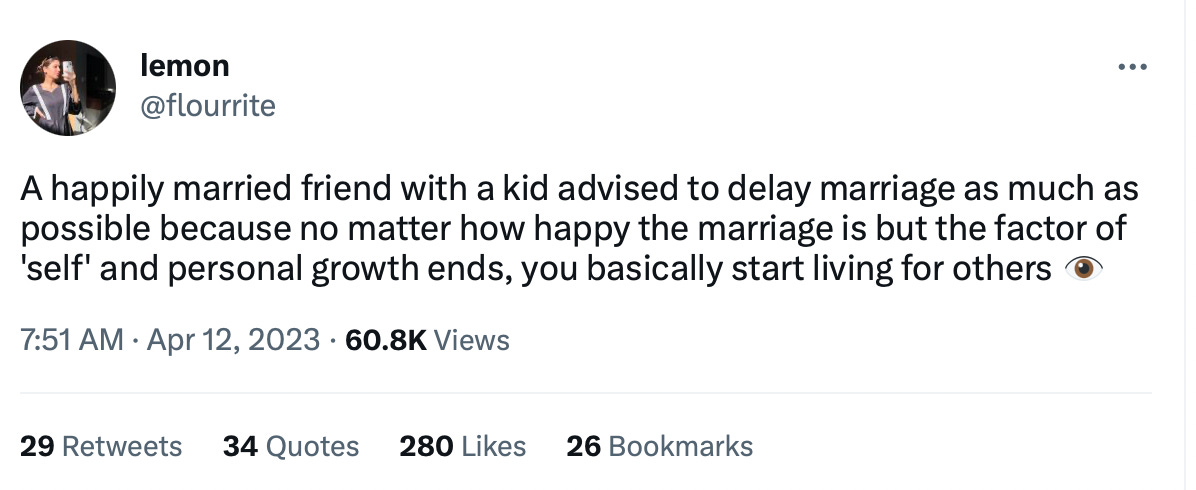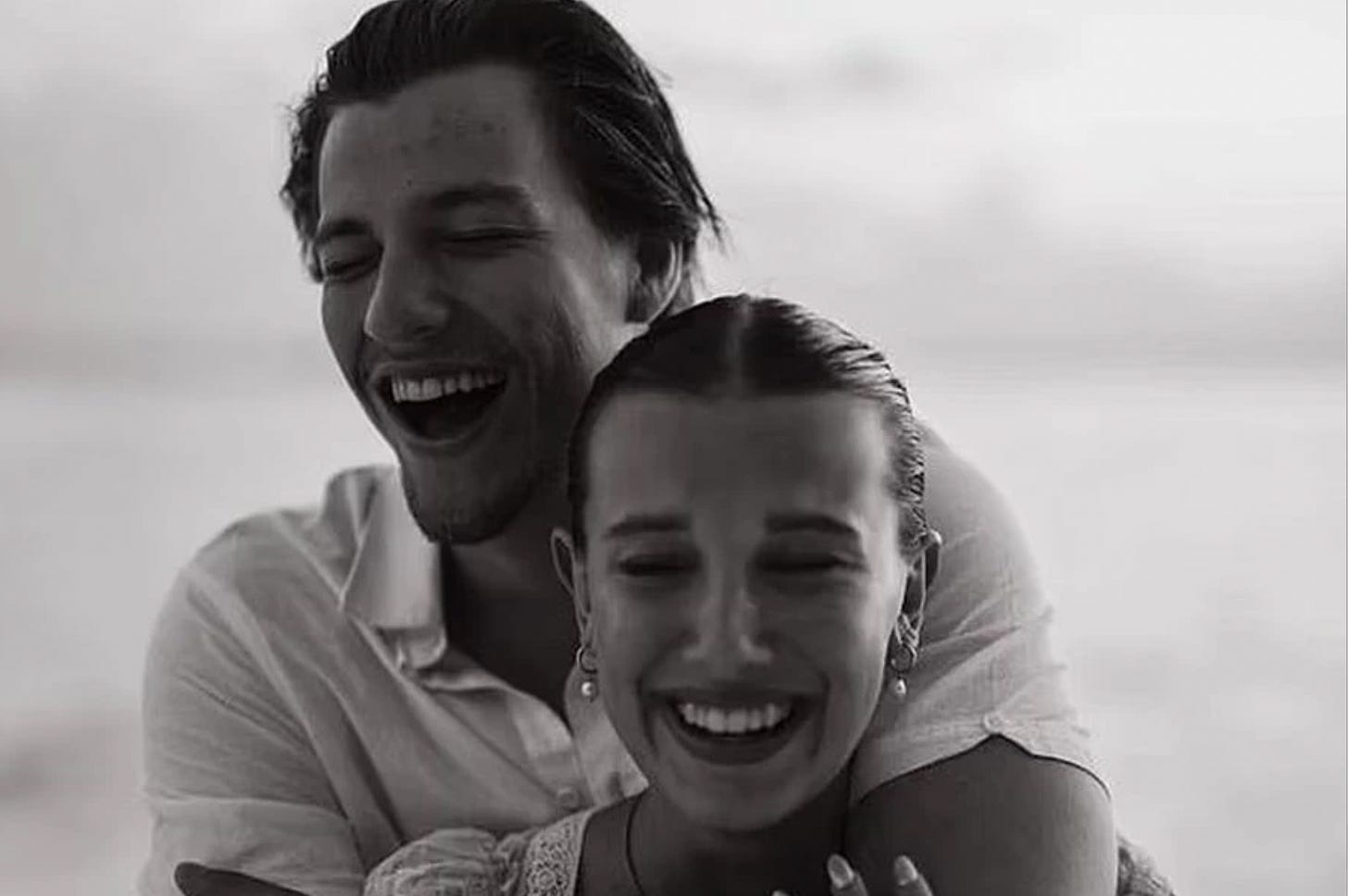Are Girls Being Lied To About Marriage?
Maybe it’s actually in others that we find ourselves
This week I’ve been thinking about marriage. I saw this tweet and it struck me:

It struck me because I think it perfectly captures the dominant cultural narrative about marriage today: that it stunts women’s personal growth and success. Found within fluorescent pink self-help books, TikTok therapy hashtags and feminist Instagram graphics is this idea that women should chase their dreams and build their career and figure out who they are before they commit. Stay single and find yourself! Your 20s are your selfish years! Explore and experiment! Like last week, when 19 year-old actress Millie Bobby Brown’s announcement of her engagement was met with comments like she’s too young, she hasn’t found herself yet, she doesn’t know who she is…

This way of thinking about marriage—as something you pursue only after you figure yourself out and achieve everything you want—is so pervasive, and, I think, at least partly why more than half of women aged 34 or under are now unmarried. In mainstream media, marriage is often portrayed as an obstacle to women’s full potential. Women admit to hating their husbands, confess that marriage can be “confining, stifling, and creativity-killing”, and see their spouses as standing in their way: “I loved my husband; it’s not that I didn’t… but he stood between me and the world, between me and myself.”
If marriage is at odds with personal growth, divorce is now the opposite: a psychological catharsis, a path to self-actualisation and self-discovery. Divorce for no reason other than vague dissatisfaction can now be a cause for celebration, a cost-free form of self-empowerment, a “radical act of self-love”—even when children are involved. Spouses split despite not being “miserable miserable.” Families fall apart so parents can find themselves. “I didn’t divorce my husband because I didn’t love him, I divorced my husband because I loved myself more,” writes a mother of two in the New York Times. I’ve written elsewhere about this glamorisation of divorce:
These days, divorce is seen as just another form of self empowerment. ‘This Valentine’s day, let’s hear it for divorce,’ wrote Vogue in February, while The Guardian recently discussed ‘the joy of divorce parties’, from smashing wedding rings to pummelling heart-shaped piñatas. Elsewhere we hear about the lavish and liberating lifestyles of divorcées: ‘Botox? No, it’s my post-divorce glow,’ declares one headline, followed by ‘far from tragic, we divorcées are going to festivals, travelling with friends and taking on toy boys.’
On social media, too, popular feminist pages present marriage as repressive, and delaying or avoiding it as empowerment. Marriage is seen as emotional labour, self-sacrifice, a forgoing of fun, ambition, self-expression and sexual liberation for misery and monotony (@feminism: “I wasn’t put on this earth to lose weight, get married and do the f***ing dishes!”). And sure, maybe these Instagram posts and TikToks aren’t meant to be taken so seriously. But I think something tragic lies behind these brazen rejections of marriage and motherhood: a belief that there can be no liberation through interdependence and stability and companionship; liberation is only found alone.
 Tiktok failed to load.
Tiktok failed to load.Enable 3rd party cookies or use another browser
Meanwhile, the self-care and wellness industry pushes an individualistic worldview that teaches girls to put their “healing” and personal needs above all else. Our partner’s flaws and expectations are no longer a natural part of a relationship but barriers to our own potential. Everything is a “red flag”; a toxic trait; “your sign to DUMP HIM!”. We’re told to cut out anyone in the way of our self-actualisation. We’re reminded to remove anyone who harms our mental health. And it feels like participating in anything that limits our personal freedom is now pathological. Doing something for your spouse without expecting anything in return is a “trauma response”. Relying on someone is “co-dependency”. Selflessness is “people-pleasing.” If your relationship is riddled with ugly, human things like forgiveness, compromise or sacrifice, you’re probably “settling.”
The message, then, is to delay marriage as long as possible — and marry only if you find a perfect partner who affirms and validates every part of you. Marriage is no longer a fusion of two flawed people, but something more like a purchase: a spouse is an accessory to you, the main character, an optional add-on to affirm your ego and make you feel good, like a ring light for your selfies. Everything is about what they can do for you, not what you can do for them. We’re taught that a spouse exists to make us happy, all the time, or we are entitled to unsubscribe.
Of course, I understand where this attitude comes from. It emerged in response to attitudes of the past, when women were pressured to marry young and remain in abusive relationships. But the problem now is that a lot of girls are only hearing this newer narrative, with all its warnings and deterrents and reasons to delay. Many of us lack healthy relationship role models in real life, too; a third of Gen Z now see their parents split by the time they are 16. What we know about relationships, then, we glean from pop culture and celebrities and TikTok trauma-informed therapists where the message is usually it’s a threat to our personhood and we should spend as long as possible focusing on ourselves.
But I don’t think that will make us happy. The opposite, actually. In a culture which sanctifies the self, where we’re encouraged to think of ourselves as the main character and prioritise our own desires and freedoms and psychological comfort over everything else—and yet are more anxious, depressed and confused about our identity than any other generation on record—maybe we should care a whole lot less about ourselves. If we love someone then maybe we should marry young, while we’re still figuring ourselves out, and figure it out together. Maybe it’s actually in others that we find ourselves.
I don’t think there’s anything wrong with not wanting to marry. But I do think there’s everything wrong with a culture that discourages young women from pursuing meaningful, lasting commitment and passes it off as empowering. And I wonder what it says about a society when the most off-putting thing about marrying young—the thing girls are advised to avoid for as long as possible—is that you might start living for others. God forbid.



I have been married for 25 years and I consider my marriage to be one of the best things in my life. I got married when I was twenty two, I wasn't pregnant. It was a conscious choice that I have never regretted. It is not true that marriage must mean the end of self-realization. In my case, on the contrary, my husband encourages me and supports me, thanks to which I can study philosophy at the university. I must say that the narrative you write about is very sad and I think it is harmful to both women and men. I will add that no one is telling them the truth that delaying marriage and parenthood has its great disadvantages. My children are practically adults, so both my husband and I have time and opportunities to fully consciously enjoy life. Looking at my friends who decided to have children late, I really feel sorry for them. Being about fifty years old and taking care of small children is difficult.You can't change the fact that we get older and the energy we have as parents in our twenties or thirties will never be the same when you're in your forties. Many late parents I know complain about fatigue, envy the time that people with adult children have for themselves. To say that they went wild in their youth is little consolation, because now they have the better material means and life experience to enjoy life to the full. Unfortunately, small children make this impossible. Looking at myself and other parents of adult children and our peers with small children, I see that the decision to become a late parent is highly overrated. This applies to both women and men.
Great article. I'd like to pick up on one idea.
The idea of 'finding oneself' has been around a long time. Young people in my day (I'm 61) used to travel to India for some reason to 'find themselves'. The premise being that there is a 'self' somewhere inside us 'to find'.
While there clearly is a well of potential in each of us that has a shape that seeks expression, the idea that you can't find this in ordinary, every day life is a nonsense, since it is in ordinary every day life that we are designed to fulfil that potential as that in reality is the only life there is.
For our forbears this was not only not an alternative, it was not even conceived of as an alternative as they dind not have the wealth or the technology or the opportunities offered by these to provide for this.
Modern life offers an increasingly fantastical array of freedoms and opportunities, which are in truth meaningless illusions. It is in succumbing to and seeking after these illusions that we loose the very self we then think we then need to find.
Leaving a long term marriage relationship to be free to find yourself is one of these.
We idolise freedom. However there is no true freedom without constraint. Freedom is only meangingful if it is freedom to be something. Absolute freedom is in truth 'nothing' but unrealised potential. At some point, to be something, even a 'self' we have to choose the constraints that are going to realise that self.
The constraints of life are the crucible in which we mould that potential not to find, but to become ourselves.
Without making the perfect the enemy of the good, a key reason why, for generations, wiser people than us decided that marriage was a solemn, sacred, lifelong contract is precisely because it provided an ordinary set of tough constraints in which we could realise the potential to be ourselves and through which to find meaning and some joy.